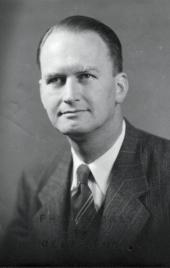
Frederick Mott was born at Wooster, Ohio on August 3, 1904, the son of pioneer YMCA missionary leader and 1946 Nobel Peace Prize co-winner John Raleigh Mott. In a family dedicated to human welfare, Fred spent many months of his teens in Europe and the Far East as secretary to his father. He married a Winnipeg girl, Marjorie Heeney, on August 5, 1930, and graduated in medicine at McGill University, Montreal, in 1932. When illness forced him to forego his ambition to be a family doctor, his idealism took him to the wider field of rural health and medical care, which had gained great significance in the Depression. Under federal authorities he conducted medical care and public health activities among low-income farmers and migratory workers throughout the United States.
Henry Sigerist had recommended Mott to T.C. Douglas as “the ablest man on the continent” to implement the hospitalization plan. The CCF government then hired Mott as chairman of the Saskatchewan Health Services Planning Commission from 1946 to 1951. He was also chair of the Saskatchewan Health Survey from 1949 to 1951. Against all odds, his administrative skills led to the almost flawless introduction of universal hospitalization in 1947. British Columbia encountered numerous problems when it next introduced hospitalization, so subsequently all other provinces sent their people to Saskatchewan to observe how it had wrestled with administrative problems which had no precedents in North America. In 1951 Mott acted also as Deputy Minister of Public Health and was Canada's representative to the World Health Organization. A man of integrity, he maintained good relations with Saskatchewan doctors.
Later, Mott set up a network of ten regional hospitals for the United Mine Workers of America, intended to serve half a million people; and at the end of his career he went to the University of Toronto to be a professor of medical care administration, from 1968 to 1972. He retired to Pittsford, New York, where he died on May 31, 1981.
C. Stuart Houston